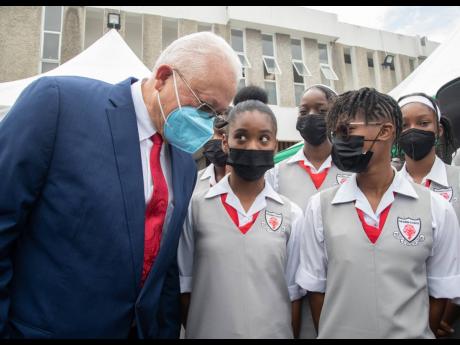Chuck: Sew up cases with air-tight evidence
Prosecutors shy to appeal bail decisions, chief justice hints
Minister of Justice Delroy Chuck believes greater wiretap surveillance and reliance on CCTV footage to gather evidence against criminals would yield better judicial outcomes for the prosecution instead of dependence on witness testimony.
“A lot more technology, a lot more non-witness evidence should become available, especially where you have surveillance or you can pick up communication between people,” Chuck told The Gleaner on Thursday following the National Public Education Symposium staged by the judiciary at the Kingston and St Andrew Parish Court.
“That is where I would support the possibility of getting information from the [telecommunications] carriers. They can use what is said between gangsters,” he added.
Chuck’s comment comes amid increased scrutiny and criticism of the criminal justice system, with the police and prosecutors accused of subpar evidence gathering. Judges have also been slammed for handing down sentences or granting bail.
Last month, five of the 33 alleged Clansman-One Don gang members were acquitted of several criminal charges ranging from murder, conspiracy to commit murder, and arson, to being a part of a gang.
The men were freed after the prosecution conceded that they lacked sufficient evidence.
Asked if legislators should seek to lower the bar for proving gang membership, Chuck stated that he was not in favour of such amendment to limiting the high rate of acquittals in gang cases.
The minister called for investigators to present air-tight cases.
“This way, as much evidence can be collected to make it crystal clear if the person is a member of a gang and is actually participating in gang activities. So I don’t think lowering the bar is the right approach,” the justice minister said.
“Increase the investigation and surveillance. It’s evidence that’s going to make the difference,” said Chang.
Legal and Constitutional Affairs Minister Marlene Malahoo Forte, however, said that the anti-gang legislation should be reconceptualised.
“I said it when it was being reviewed by the joint select committee and I maintain that,” she said.
Malahoo Forte caught heat last week for a comment that suggested the denial of bail to persons charged with serious crimes.
Said the constitutional affairs minister: “If you on murder charge, you cannot be at large, and if you on gun charge, you cannot be at large.”
The statement drew strong criticism from criminal-defence attorneys, who have argued that any amendment of the Bail Act to reflect this position would be unconstitutional.
Chuck sought to defend his colleague minister, insisting that critics reserve comment until the bill is presented to Parliament.
“When the act is tabled in Parliament, then we can examine and discuss it. But there is so much speculation that it’s really unfair to the minister that these criticisms are out there without knowing what the act entails,” said Chuck.
At the same time, Chief Justice Bryan Sykes pointed to legislation in defending judges’ decision to grant bail to persons charged with serious crimes, arguing that if the prosecution disagrees, there is a provision for appeal.
Sykes commented on the controversial matter in his keynote address at the symposium.
Pointing to the Court of Appeal’s 2018 guidance in a matter involving Huey Gowdie on how the bail process should be handled, Sykes noted that judges are to take into account the risk of the defendant absconding, the risk of the defendant interfering with the course of justice, preventing crime, preserving public order, and the necessity of detention to protect the defendant, among other things.
“In 2010, the Bail Act was amended. One of the important provisions, Section 10, was amended and has been there for a decade now, and that provision survived the constitutional challenge,” said Sykes.
Section 10 of the Bail Act speaks to the right of appeal.
Subsection (2) outlines that where bail is granted to a defendant by a court pursuant to the act, the prosecution may appeal to a judge of the Court of Appeal in respect of the decision.
“In plain English, what this means is that if the judges in the trial court grant bail, Parliament gave the prosecution a right of appeal. It has been there for over 10 years. The question is, has that provision been utilised by the Crown? And if so, how many times, [and] with what result?” Sykes questioned.
“... So when we have persons making all sorts of pronouncements about judges granting bail, have they looked at the statute? More importantly, have they read the statute, and having read, have they sought to utilise the power given under the statute?”

